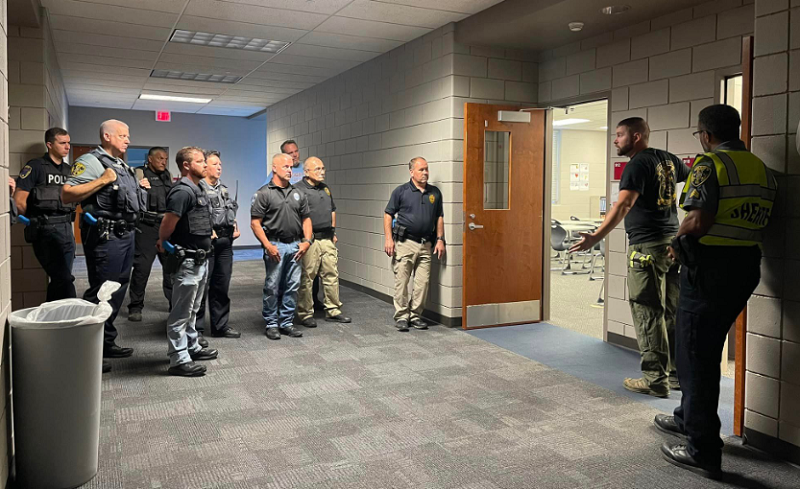
Summer break for students is segueing to back-to-school sales at retailers, marking the season when school resource officers (SROs) gear up and prep for the new semester. Given the tumultuous climate in our society, with educational institutions targeted by armed whackos harboring hatred, it is increasingly imperative for school-assigned cops to train, train, train.
As realistic as possible, law enforcement agencies have been training in a multitude of scenarios on the physical premises of school grounds, enacting responses to potential threats which may erupt at any given moment on any campus in America.
As our friends at BJJ.cops punctuated, “If you’re in law enforcement, continuous training isn’t just a recommendation; it’s a responsibility. Stay safe, stay trained.”
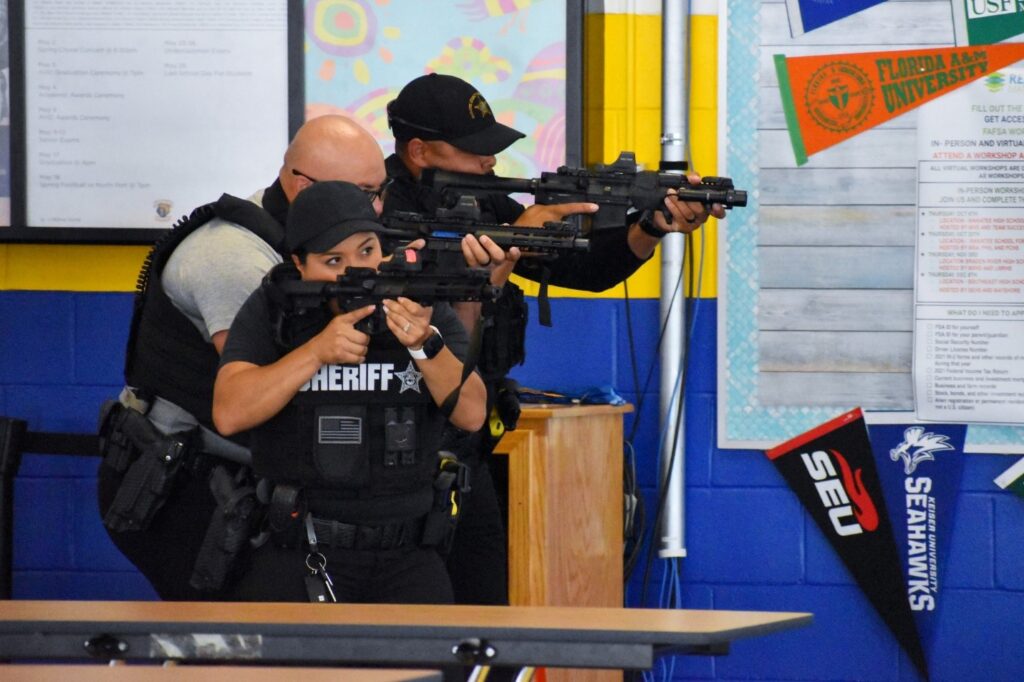
(Photo courtesy of the Manatee County Sheriff’s Office.)
Pre-semester training is not necessarily new but does have advancements in modern policing, influenced by a society showing signs of depraved individuals who absolutely must be thwarted by courageous, skilled police professionals responsible for gatekeeping our youngsters.
“While students have been enjoying the last few days of summer before heading back to school, our School Resource Deputies (SROs) have been practicing skills they need to keep students safe. Last week, they trained with SWAT team members and ran through several scenarios. The role of protecting students is one that each of our SROs takes very seriously and considers a privilege,” said Manatee County Sheriff Rick Wells.
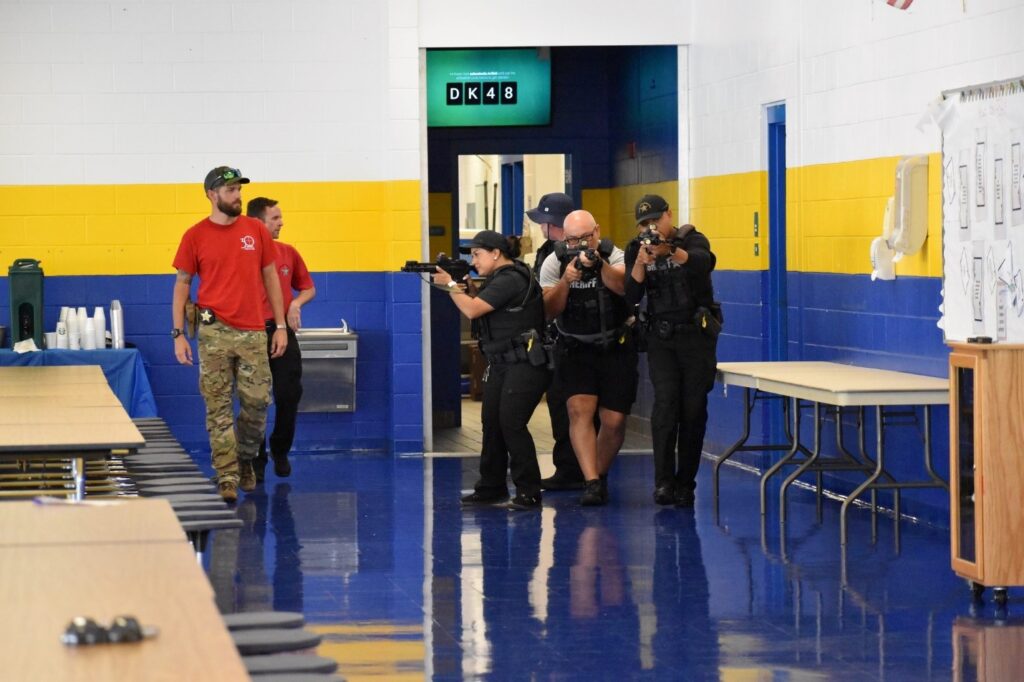
(Photo courtesy of the Manatee County Sheriff’s Office.)
Previously, the National Police Association published a piece about police training instructors, typically donning red shirts, mentoring sworn colleagues through training drills, honing skill sets, and offering professional advice as they move through scenarios that could be a reality at any given moment on any day in any jurisdiction.
Often, sharply skilled SWAT team operators are involved in police training modules with their respective agencies or neighboring ones. We are witnessing more law enforcement organizations from varying jurisdictions training together, striving to become an adhesive unit used to quell major events with combined resources, all on the same page: Mitigating violence.
In the context of potential active shooters and the proliferation of these sordid sagas, we must ensure top-notch guardians are not only on campus but duly prepared to confront armed evildoers and ensure safe harbor for our children.
Selecting and Shaping SROs
Similar to other specialty units in police agencies, SROs are culled from personnel who indicate interest in the role and often come to the table with some facet(s) relative to working with kids. Some agencies may require a background involving interactions with youngsters, which is ideal. However, command staff vets their cops well enough to realize that, minus having a few gold stars from working with the juvenile demographic, candidacy requires character traits pertinent to the special duty.
Much like a civilian seeking to become a law enforcement officer, showing interest in the role (applying) and sitting for an Oral Board interview conducted by a contingent of police peers/school officials, is part of the selection process.
Once officially chosen, each candidate must attend weeks of training specific to policing campus facilities, indoctrinating them to the lay of the land and gobs of developing minds needing direction and listening ears. But safety is the paramount ingredient for which SROs are imperative.
A repository for all-things-school-resource-officer, the National Association of School Resource Officers (NASRO) is where new SROs gain the fundamental frameworks to effectively suit the role, and from whom experienced SROs garner additional knowledge to cater to the student population, all wrapped up in safety feats. As NASRO coined at their recent National School Safety Conference, SROs are “Racing Towards Safer Schools.”
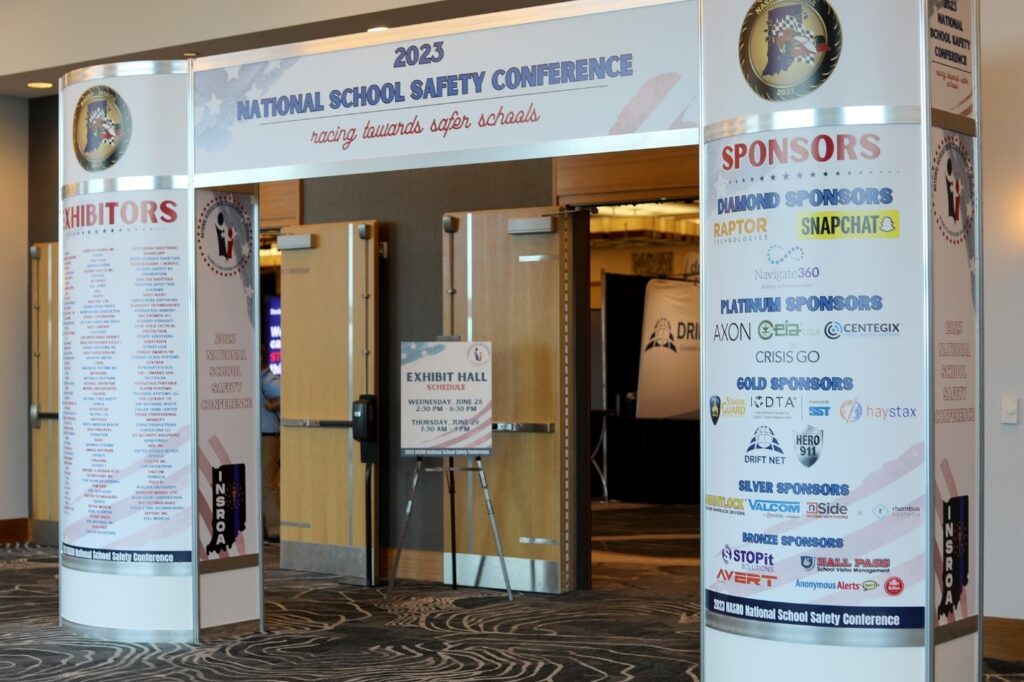
(Photo courtesy of the National Association of School Resource Officers.)
NASRO recently posted the following statement:
“Students deserve to feel safe at school! A feeling of increased safety is one of many benefits of school resource officer programs where officers are carefully selected, specifically trained, and properly equipped.”
As with governing bodies that compose policies and chronicle certification (licensure) of law enforcement officers, school resource officers are also represented by their respective states. For example, the Florida Association of School Resource Officers (FASRO) provides training to sworn LEOs within the Sunshine State.
Although both national- and state-level associations of school resource officers provide instruction at their respective police headquarters, they also cater remote-based opportunities by coordinating classes for prospective SROs, delivering requisite programs at localized settings, usually a police agency hosting courses taught by association-linked instructors.
Small agencies (which comprise a majority of America’s 18,500 or so law enforcement entities) typically have modest budgets and will thus opt for the latter, having their SRO candidates taught in familiar zip codes.
As with any special educational endeavor for which cops are required to attend and complete, formal graduations ensue whereupon bona fide certificates are granted.
School Resource Officer Practitioner Designation
Mirroring NASRO’s mission and structure, the Florida Association of School Resource Officers site has a blurb encompassing “basic” SRO candidate curriculum and certification:
“The Attorney General’s Office, in 1985, developed the first 40-hour Basic Training Course adopted by FDLE [Florida Department of Law Enforcement] to train SROs with basic knowledge and skills necessary to implement crime prevention programming in a school setting.
“The definition of a School Resource Officer encompasses three major components of his/her job: that of law enforcement, education, and counseling, which is a pro-active approach to law enforcement through positive role modeling. These three components allow the SRO to promote positive relations between youth and law enforcement which encourages school safety and deters juvenile delinquency.”
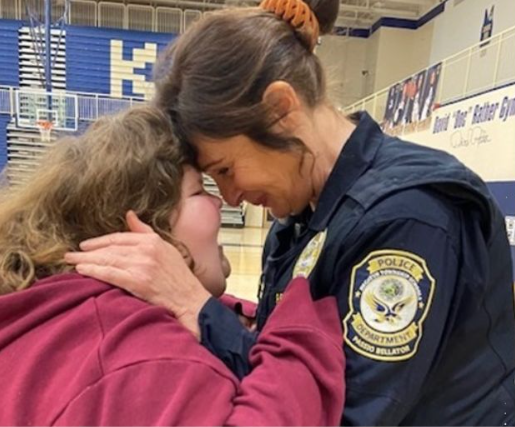
(Decatur Township School PD SRO praises student achievements. Photo courtesy of the National Association of School Resource Officers.)
That is a nutshell version defining the role of a school resource officer. Beyond basic training courses are advanced training courses for established SROs. For instance, the curriculum continues for “experienced SROs who attend a minimum of 130 hours of juvenile-related courses,” recognizing officers who “demonstrate their commitment to the School Resource Officer program through the [many] hours spent in furthering their education and knowledge” by attending “90 hours of SRO instruction […] in the form of workshops and seminars.”
NASRO rolled out SRO courses at all levels throughout the summer.
With some looney lawmakers and/or localized elected officials jumping on the moronic bandwagon of defunding the police, some of the requisite academics to be duly certified SROs may have gone by the wayside (snatched funds), ultimately impacting school safety, rendering vulnerable the students who shouldn’t have to worry about potential threats encroaching where they are trying to blossom their brains. Politics ruin great ventures and altruistic intent, huh?
Nevertheless, we do have forward-stepping courageous cops especially equipped with counseling capacities for youngsters and skill sets honed during the off-season and thereafter.
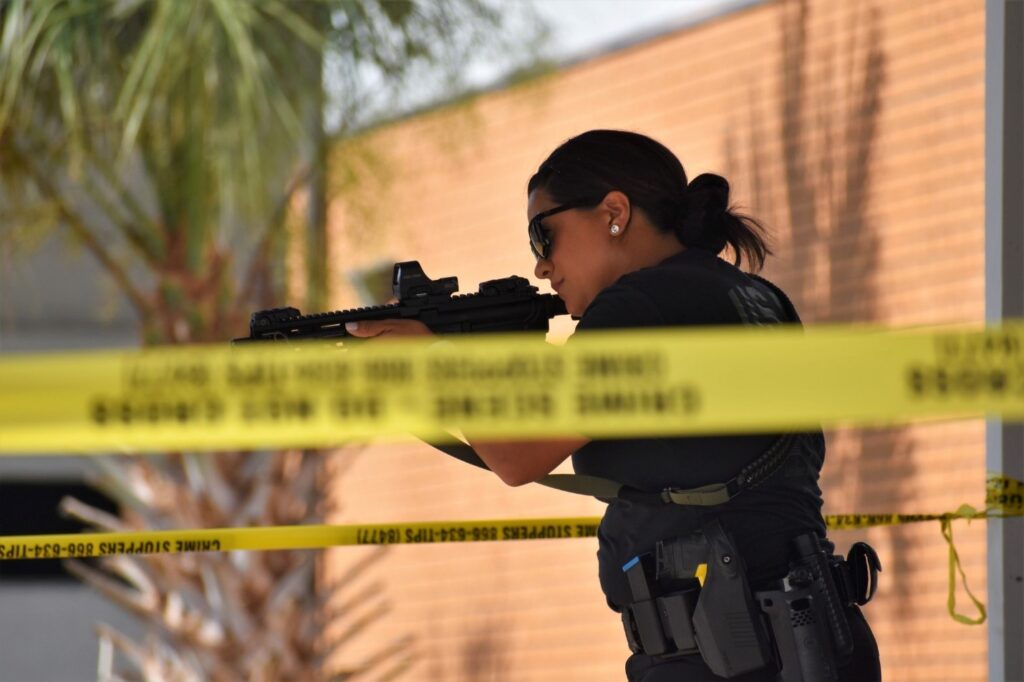
(SRO Osorio is in training mode on school grounds this summer. Photo courtesy of the Manatee County Sheriff’s Office.)
Logically, SRO training is most often rolled out directly on campus grounds and in the hallways of schools, refining tactics and developing strategies of the chosen cops responsible for safeguarding scores of students from monsters who seek to inflict mayhem upon innocents.
Especially nowadays, no one needs to be reminded how imperative it is to have superiorly trained and well-equipped guards at the gates…those who attained the status of SRO.
With two of his cops recently shot and hospitalized in critical condition, Orlando police Chief Eric Smith still took the time to gather all of his agency’s SROs, all of whom trained throughout the summer (using actual students in scenarios, so that they, too, can become more aware/responsive), for a pre-semester pep talk, underscoring, “Know that in the face of danger, our officers are trained and willing to put their lives on the line for our community, including our kids.
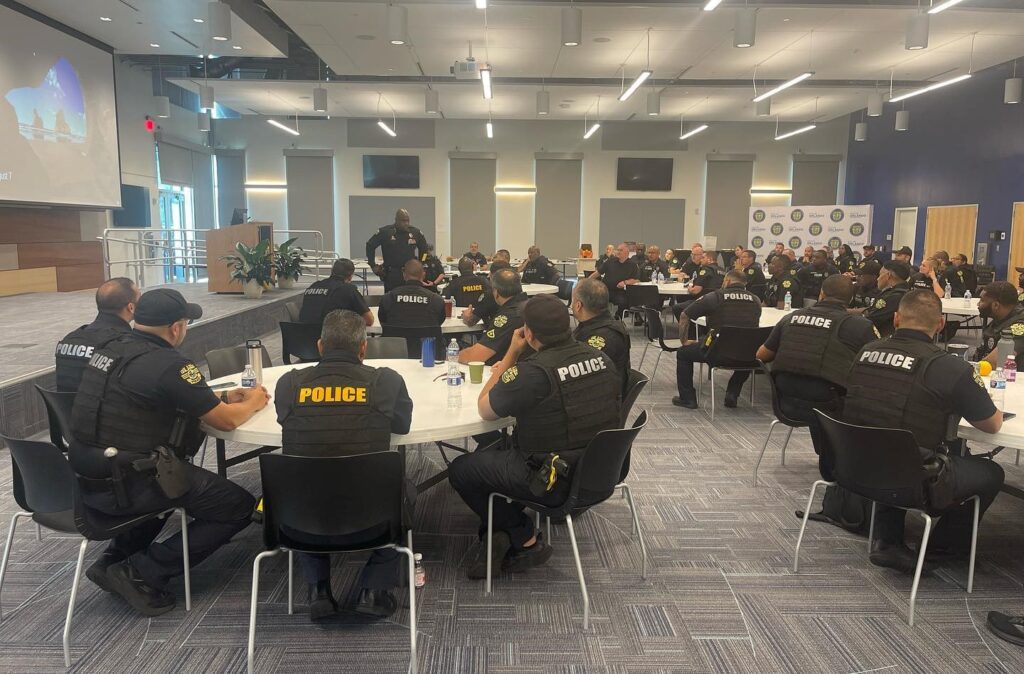
(Photo courtesy of the Orlando Police Department.)
“Together, let’s make this school year the safest it can be.” The sounds of cops championing a better life for many others are not new. Legacy media has largely ignored triumphs such as these, but law enforcement organizations still forge forward with the mission the citizenry has entrusted them to carry out.
We close with a statement rendered by Manatee County Sheriff’s Office SRO Osorio: “The school environment needs to be a safe environment for kids. They don’t need to be worried about anything but learning. They are our future, and we need to make sure they’re protected and well-prepared.”
Bottom line: “We hope we never need to use these skills, but in the event we do we will be ready.” That’s what was printed on a sheriff’s office website…to which I am certain everyone can relate.
Hats off to America’s legion of law enforcement officers who don the SRO pin, dutifully surrogate our youth, and help further their educational pursuits, all while ensuring the campus boundaries are not breached by evildoers.